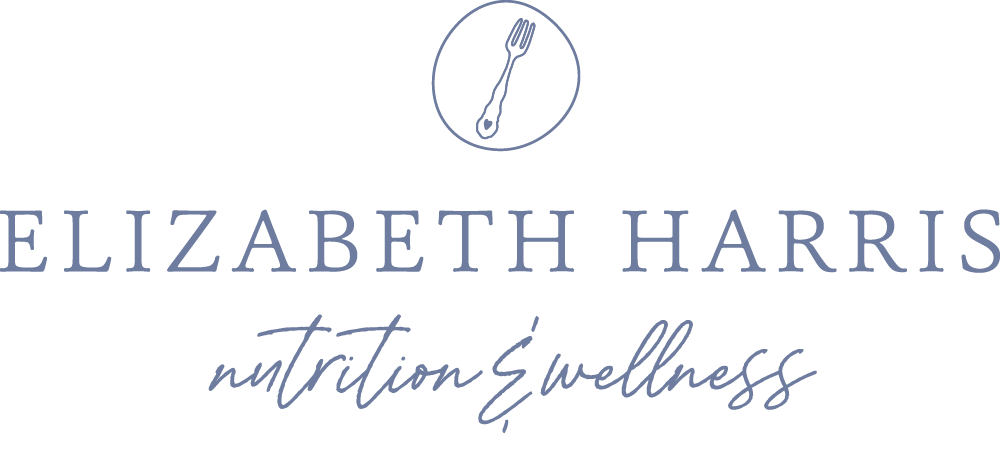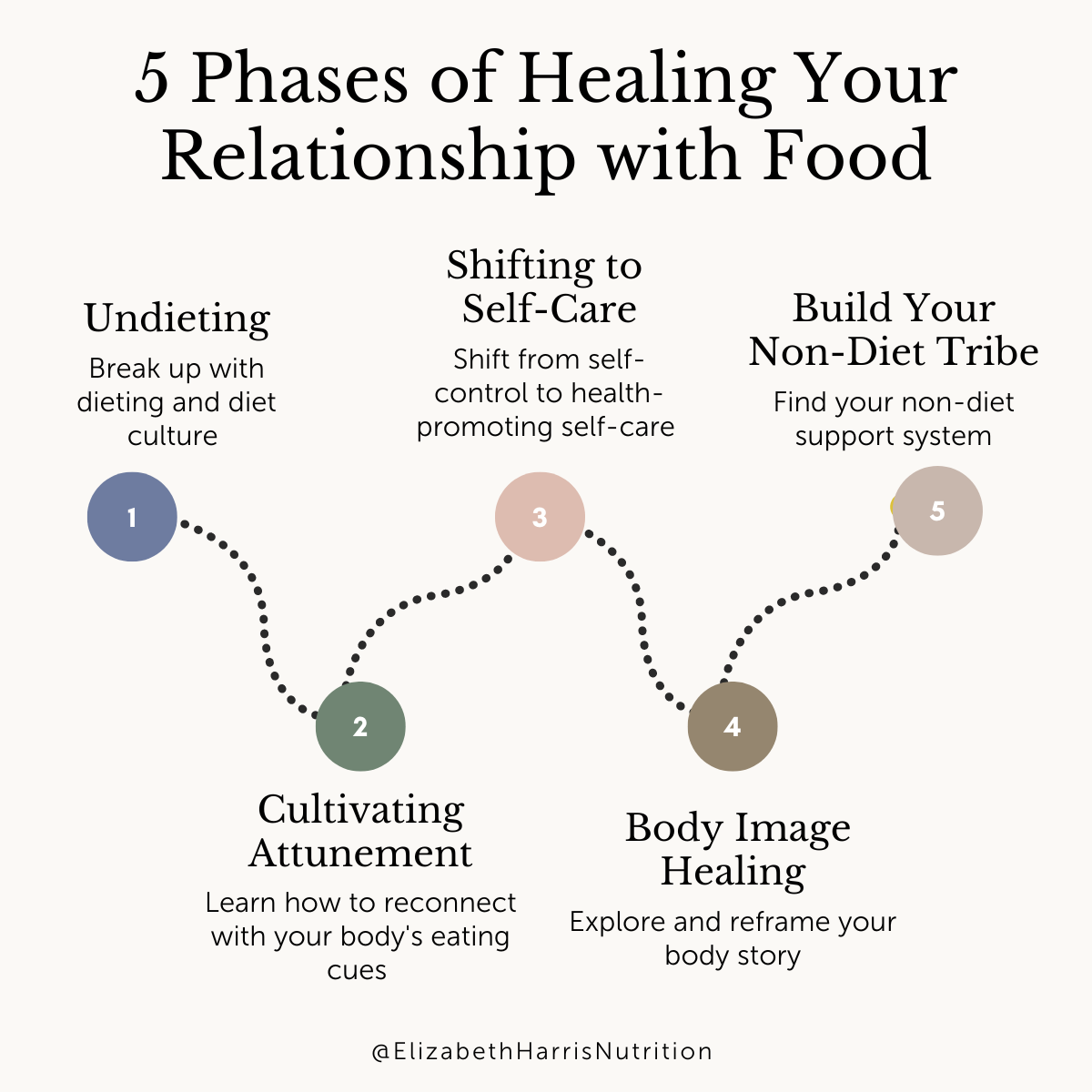Can You Lose Weight with Intuitive Eating? (+ examples)
If there’s one question nearly everyone who considers or begins an Intuitive Eating journey wants answered it’s this: “Can I lose weight with Intuitive Eating?”
So, here’s the truth straight from a dietitian and certified Intuitive Eating counselor who’s helped hundreds of women learn to eat intuitively.
One of three things will happen when you begin an Intuitive Eating journey:
You’ll lose weight
You’ll gain weight
Your weight will stay exactly the same
I know that answer probably feels incredibly frustrating and confusing; and yet, it’s the only honest answer I can give you.
Whether you lose weight with Intuitive Eating or not depends on many factors, including your genetics, environment, age, hormones, current health status, what medications you take, your individual starting point with regards to certain health behaviors, and many other factors.
But there’s much more to understanding where weight loss fits in with Intuitive Eating than that. Here’s what you need to know…
Intuitive Eating Isn’t Another Diet in Disguise
Recently, someone said to me, “Elizabeth, I hear you talking about Intuitive Eating, and it sounds great; but I still don’t understand. How can it not be a diet?”
I think it’s a testament to how incredibly ingrained diet culture is in our collective mindset that we almost can’t even fathom an approach to nutrition or healthful eating that isn’t focused on weight loss.
And yet, while you may or may not lose weight with Intuitive Eating, the overarching purpose is not to lose weight. It’s to break up with dieting and diet culture, to have or to cultivate a happy, healthy relationship with food and your body, and to adopt sustainable and enjoyable health-promoting behaviors.
I’m forever reminding anyone who will listen that health-promoting behaviors may or may not lead to weight loss—but they’re still health-promoting and meaningful to engage with.
In contrast, whether you call it a diet, a lifestyle change, a clean eating program, a detox, or any other name, dieting is a calorically restricted way of eating that aims to intentionally produce weight loss or to change the size or shape of one’s body. Many dieting behaviors are actually disordered eating behaviors or just plain not healthful.
It bears repeating, weight and health are not the same thing.
Why Intuitive Eating and the Intentional Pursuit of Weight Loss Don’t Mix
There are two main reasons why we don’t focus on weight loss with Intuitive Eating.
For starters, the primary objective of Intuitive Eating is to heal your relationship with food, mind, and body from the harm done by dieting and diet culture. Dieting leads many eaters to:
Feel guilt or shame for eating certain foods
Be confused about food and nutrition
Swing between restricting and overeating
Experience body dissatisfaction or distress
Struggle with yo-yo weight gain and loss
Have trouble respecting their hunger and fullness cues
Mistrust their body’s ability to self-regulate with food
Feel as though they can’t keep certain foods in the house for fear of overeating or bingeing them
Struggle with emotional eating
The Research Is Phenomenally Clear that Dieting Doesn’t Work
The second reason Intuitive Eating does not promote intentionally pursuing weight loss is because there’s a plethora of research to show that dieting doesn’t work. To be clear, that does not mean that you can’t or won’t lose weight by following a diet.
It means you’re highly unlikely to lose weight and keep it off over the long-term. Here’s just a small glimpse at some of the findings on dieting and long-term weight loss:
1/3 – 2/3 of people who go on diets gain all the weight back within one year
Almost all dieters gain back all the weight they lost within 5 years
2/3 of people who go on a diet will ultimately gain MORE weight than they lost to begin with
Dieting is one of the strongest predictors of weight gain regardless of the dieter’s body weight
If you’ve experienced the ups and downs of dieting and yo-yo weight fluctuations, please know that you didn’t fail all those diets. They failed you.
But What If I Need to Lose Weight Due to My Health Concerns?
Often people wonder what happens if they need to lose weight because they have specific health concerns. The body mass index or BMI is the main weight-based standard we’re given to measure health status in our culture.
However, there are a great many criticisms of the BMI, and many experts agree that it’s a flawed and not terribly useful indicator of health.
Yes, higher weights have been linked with certain chronic diseases. However, correlation does not equal causation. This means we can’t conclude that being at a higher weight causes poor health outcomes. Most of the research on weight and health excludes or ignores the impact of weight stigma, which we know is an independent risk factor for poorer health outcomes.
Another variable that muddies the research on the connection between weight and health outcomes is the impact of weight cycling, or the yo-yo weight gain and loss that occurs with dieting. Research has found that weight cycling itself is linked with increased risk for heart disease and increases in inflammation and cortisol, both of which can increase the risk of chronic diseases.
Beyond that, when we see improvements in health markers with weight loss it’s typically impossible to tell whether those improvements are due to the weight loss itself or a result of the improved behaviors associated with weight loss.
The truth is that normal bodies come in all shapes and sizes and people can be healthy or unhealthy at both low and high weights. Plus, as we saw above, the pursuit of weight loss takes its own physical, mental, and emotional toll on health and wellbeing.
Rather than focus on weight loss, Intuitive Eating zooms out to consider physical, mental, and emotional wellbeing—what I refer to as whole health. As a weight-neutral approach to health, it also promotes shifting your focus to health-promoting behaviors and other, more useful measures of health than the number on the scale, including lab markers, health screenings, exercise tolerance, and more.
If It’s Not About Weight Loss, What Can I Expect with Intuitive Eating and How Will I Know If It’s Working?
So, if we don’t focus on calorie targets or prescriptive meal plans or use weight to measure success with Intuitive Eating, how do you practice it? And how do you know if it’s working?
I walk my clients through five phases of Intuitive Eating healing, including:
1. Un-dieting your mindset and breaking up with diet culture
2. Reconnecting and rebuilding trust with your hunger and fullness cues and other body wisdom
3. Adopting sustainable self-care behaviors, including gentle, sustainable nutrition
4. Healing your body image
5. Finding your non-diet tribe
The before and after impact of Intuitive Eating looks a bit different for everyone; however, here’s just a small sampling of some of the ways in which Intuitive Eating commonly changes lives. It teaches you how to:
Confidently self-regulate your eating without counting calories, points, or macros (or feeling like you should be)
Trust yourself to keep any food you want in your pantry or fridge without obsessing over or bingeing it
Reliably respect your hunger and fullness cues
No longer feel guilt or shame about your food choices
Feel more confident and comfortable in your own skin
Lower food and eating stress (and reclaim your valuable time, energy, and mind space to focus on things other than food and dieting)
Adopt sustainable health behaviors that can improve lab markers
Boost your mood, self-esteem, and encourage more positive self-regard
Enjoy food more
Improve your overall eating patterns, and so many other benefits
How to Spot Fake Intuitive Eating
As Intuitive Eating has grown in popularity and the evidence showing its benefits has mounted, many companies and individuals have coopted Intuitive Eating, touting it as method for weight loss. If you see this, please know that it’s not really Intuitive Eating and likely not coming from a certified Intuitive Eating counselor or reliable source.
As I said at the outset, while Intuitive Eating may result in weight loss for some individuals, it is intended to be an anti-diet approach to health and wellbeing.
Intuitive Eating Can Help You Find Your Weight Set Range
Intuitive Eating can help you still the pendulum between restricting and overeating while also helping you find your weight body’s natural and preferred weight range—typically the place where your body naturally settles when you’re no longer dieting or weight cycling, when you’re engaging in gentle nutrition and regular movement patterns, and prioritizing consistent, health-promoting self-care.
You might think of it as your body’s happy place.
Given this and the many other benefits of Intuitive Eating and healthful self-care, rather than asking, will I lose weight with Intuitive Eating, I encourage you to ask yourself this instead. What might I GAIN from learning to eat intuitively and make peace with food and my body?


